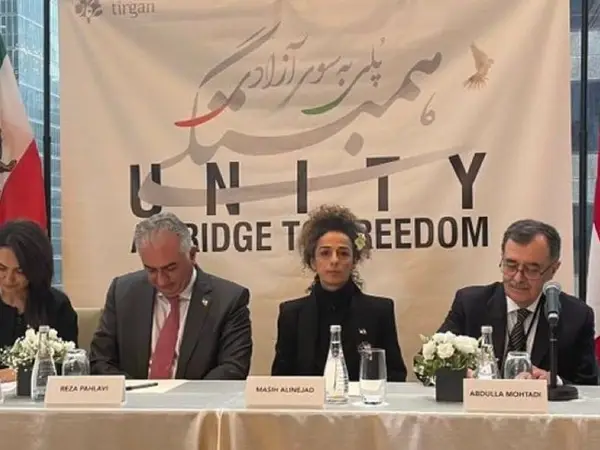Whether the future government of Iran, after the Islamic Republic should be a federal or a centralized government is one of the most divisive issues among the activists.
Diaspora opposition groups and figures have held several gatherings and released various charters of solidarity and alliance in the past few months. Nearly unanimously, everyone says it is the Iranian people who should decide, through a referendum, the form of the future government in Iran.
The biggest diaspora alliance, the Alliance for Democracy and Freedom in Iran, which announced its existence in a February event at Georgetown University and issued its charter, the Mahsa Charter, in early March, advocates a secular-democratic system determined through a referendum but has not specified whether this could be a federal or a centralized government.
The alliance consists of the exiled Prince Reza Pahlavi, Nobel peace prize laureate Shirin Ebadi and Canada-based activist Hamed Esmaeilion, as well as US-based author, journalist and women’s rights activist Masih Alinejad, actress and activist Nazanin Boniadi and Secretary General of the Kurdish Komala Party Abdullah Mohtadi.
The six members of the alliance stress that for the time-being they have agreed on “minimal positions” that could create the most consensus among the opposition and that it could be further improved.
Many who support the diaspora opposition have already made up their minds whether they want a republic or the return of the Pahlavi monarchy which was ousted by the Islamic Revolution of 1979. The true weight of those favoring one or the other tendency is not known.
Prince Reza Pahlavi has said that he will accept whatever form of government Iranians choose and at least on one occasion in the past has said that he personally favors a republic.
But some opposition supporters known as ‘constitutionalists’ are staunchly against establishing a republic of any form in Iran, particularly federalism, seek the revival of a constitutional monarchy and the Iranian Constitution of 1906.
Among the members of the alliance, Mohtadi has been the most vocal advocate of ethnicity-linguistic-based federalism. “I would personally like the charter to more clearly move towards [recognition of] federalism,” he told Iran International on the sidelines of an opposition conference in Toronto, Canada, Sunday. At least two other members, Alinejad and Esmaeilion, also appear to be advocates of decentralization of the government or some type of federalism.
“Any kind of ethnicity-based federalism will be a fascistic regress in Iran and [cause] violation of basic human rights. Ethnic groups are intertwined and drawing lines between Iranian ethnic groups on the imaginary ground that they are racially different will lead to years of civil war. We are one nation, the Iranian nation,” one of the opponents of ethnicity-linguistic based federalism tweeted Tuesday.
Those favoring federalism, however, say economic, ethnic and religious inequality in a multi-ethnic and multilingual country like Iran requires recognition of ethnic differences and decentralization of the government. Many among them also demand recognition of other languages such as Kurdish, Turki, Balochi and Arabic as official languages and the right of non-Persian speakers to education in their mother tongues instead of Persian (Farsi).
Yet others advocate a non-ethnicity-linguistic-based form of federalism to avoid problems such as disputes over geographical boundaries of federal states in mixed ethnicity-linguistic areas of the country.
Many provinces in Iran have mixed ethnic or linguistic populations, such as West Azarbaijan or the oil-rich Khuzestan. Trying to create ethnically homogeneous provinces or states peacefully, would be next to impossible.
“Yes to political and no to ethnicity defined federalism. Yes to American and no to Yugoslavian [types of federalism],” @Ted_Mosbi1361 who is among Persian-language Twitter opposition influencers tweeted Friday.
